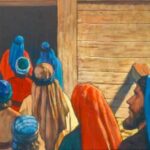Where shall I go from your Spirit? Or where shall I flee from your presence?If I ascend to heaven, you are there! If I make my bed in Sheol, you are there!If I take the wings of the morning and dwell in the uttermost parts of the sea,even there your hand shall lead me, and your right hand shall hold me.If I say, “Surely the darkness shall cover me, and the light … [Read more...] about The Weapon of the Heart
grace
Genesis – The Favor of God
Then the LORD said to Noah, “Go into the ark, you and all your household, for I have seen that you are righteous before me in this generation." Genesis 7:1 If you are driving along a road and you see a sign that warns of impending danger ahead, do you ignore it or do you follow the detour to safety? If you have been provided a means of rescue from forthcoming danger, and … [Read more...] about Genesis – The Favor of God
Genesis – The Judgement of the World
And God said to Noah, “I have determined to make an end of all flesh, for the earth is filled with violence through them. Behold, I will destroy them with the earth. Make yourself an ark of gopher wood. Make rooms in the ark, and cover it inside and out with pitch. This is how you are to make it: the length of the ark 300 cubits, its breadth 50 cubits, and its height 30 … [Read more...] about Genesis – The Judgement of the World
Genesis – The State of the World
So the Lord said, “I will blot out man whom I have created from the face of the land, man and animals and creeping things and birds of the heavens, for I am sorry that I have made them.” But Noah found favor in the eyes of the Lord. These are the generations of Noah. Noah was a righteous man, blameless in his generation. Noah walked with … [Read more...] about Genesis – The State of the World
Genesis – The Controversial Legacy of the Nephilim
When man began to multiply on the face of the land and daughters were born to them, the sons of God saw that the daughters of man were attractive. And they took as their wives any they chose. Then the Lord said, “My Spirit shall not abide in man forever, for he is flesh: his days shall be 120 years.” The Nephilim were on the earth in those … [Read more...] about Genesis – The Controversial Legacy of the Nephilim




